A Theatrical Look at Film, Feminism, & Race in “By the Way, Meet Vera Stark” At the Geffen Playhouse, Los Angeles
By Marilyn Anderson | October 7th, 2012 | Category: Entertainment, Theater Reviews | Comments Off on A Theatrical Look at Film, Feminism, & Race in “By the Way, Meet Vera Stark” At the Geffen Playhouse, Los Angeles
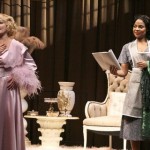 Night on the Town with Marilyn Anderson
Night on the Town with Marilyn Anderson
Pulitzer Prize winner Lynn Nottage’s “By the Way, Meet Vera Stark” had its West Coast premiere at the Geffen Playhouse on opening night, September 26, 2012. Directed by Jo Bonney, the comedy combines history and pop culture, theatrics and multi-media for an entertaining look into race, film, and feminism.
The play opens with 1930s Hollywood star, Gloria Mitchell, telling her maid, Vera Stark, that she doesn’t want to see her man-caller at the door. She is, in fact, ill and dying. But surprise! We soon find out it’s just a script Gloria is reading for her screen test of a new movie. Gloria is “America’s little sweetie pie,” and it turns out that her black maid is also an actress-come-to-Hollywood-to-make-it-but-working-a-real-job while waiting for her chance at a movie career.
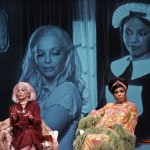
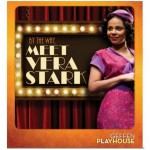 Obviously, Vera doesn’t have a lot of opportunity in the movies, because black women were limited in the 1930s to occasional, stereotypical kinds of roles–and even when there were parts, they had few lines. But wait—at a party, the producer and director of a new Southern epic, “The Belle of New Orleans,” show up and are looking for a “real colored” gal, not an actress.
Obviously, Vera doesn’t have a lot of opportunity in the movies, because black women were limited in the 1930s to occasional, stereotypical kinds of roles–and even when there were parts, they had few lines. But wait—at a party, the producer and director of a new Southern epic, “The Belle of New Orleans,” show up and are looking for a “real colored” gal, not an actress.
What’s more, they want her to be a downtrodden soul with a sob story in her background. Vera immediately rounds her shoulders and makes up a tale of woe and, by the end of the act, the maid and her two roommates are on their way to becoming lead actresses in the movie.
We’ve been introduced to Vera’s roommates in an earlier scene at their apartment. Vera and chunky Lottie watch skeptically as feisty Anna Mae leaves for her date with the director, who “thinks” she’s Brazillian because she’s faked a perfect Latin accent.
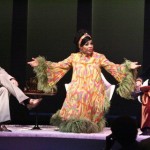
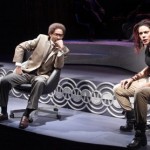 The first act is a fun romp. As in the period it takes place, it’s a little old-fashioned, but the fun and comedy work well, and the performances are excellent. Tony Award winning actress Sanaa Latham in the title role of Vera is captivating, and Amanda Detmer is delightful to watch as coquettish actress Gloria.
The first act is a fun romp. As in the period it takes place, it’s a little old-fashioned, but the fun and comedy work well, and the performances are excellent. Tony Award winning actress Sanaa Latham in the title role of Vera is captivating, and Amanda Detmer is delightful to watch as coquettish actress Gloria.
Kimberly Hébert Gregory as the spirited Lottie steals every scene she’s in, and Merle Dandridge gets to have loads of spark and personality changes as she goes from African American to Hispanic Anna Mae in the first act—and then completely changes her persona in the second act.
In fact, Act Two is a complete change of style and era as it moves us decades forward to take place during current day in a film seminar discussing Vera Stark’s illustrious career.
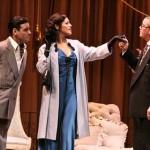 After her movie “The Belle of New Orleans” became a classic, Vera starred in many other films, then became a singer and an alcoholic, who ultimately “disappeared” from Hollywood.
After her movie “The Belle of New Orleans” became a classic, Vera starred in many other films, then became a singer and an alcoholic, who ultimately “disappeared” from Hollywood.
The second act is more contemporary in both content and style. It starts with a whimsical multimedia presentation; the end beats of “The Belle of New Orleans” are shown on a movie screen. It’s clever and cute and brings the play into modern times, even though the film itself is purportedly from the 1930s.
The three cinema experts discussing it are Leroy Barksdale, Carmen Levy-Green, and Afua Assata Ejobo, played by Kevin T. Carroll, Kimberly Hébert Gregory, and Merle Dandridge in their new roles.
This is an actor’s dream—to get to play different characters in one play. As the three discuss the film, it seems almost like an SNL sketch. It’s funny and they are funny, but we never quite get into the real depth of the subject they are discussing.
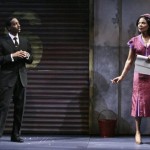
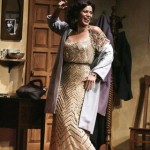 The film historians also view a 1973 TV talk show with the appearance of the 40-years-older-than-before Vera Stark, who achieved success playing clichéd black women’s roles and then became a singer and then, oh no, went through two husbands and alcoholism.
The film historians also view a 1973 TV talk show with the appearance of the 40-years-older-than-before Vera Stark, who achieved success playing clichéd black women’s roles and then became a singer and then, oh no, went through two husbands and alcoholism.
The “switches” from the seminar to the movie to the TV show—to seeing the TV show live—are all clever conventions and bring energy and variety to the play, and make it more modern in style than the first act. The main problem is that we never really get invested enough in the characters. It’s all great fun, but it doesn’t allow the audience to particularly care enough about anyone.
The performances are uniformly terrific. Kevin T. Carroll comes to ebullient life as the film seminar leader. Likewise, when Merle Dandridge plays the African-American punk lesbian, she is sassy, smart and grabs both your attention and your heart.
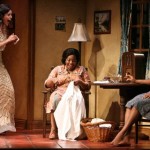 Guesting on the set of the 1973 TV show, Sanaa Lathan does a special turn as the older Vera Stark, who reminds us of Lena Horne. Spencer Garrett as the TV host is hilarious, and the comic bit with Mather Zickel as a British rock star is a hoot.
Guesting on the set of the 1973 TV show, Sanaa Lathan does a special turn as the older Vera Stark, who reminds us of Lena Horne. Spencer Garrett as the TV host is hilarious, and the comic bit with Mather Zickel as a British rock star is a hoot.
Bottom line: The comedy has exceptional performances and is an entertaining evening about an interesting subject that is mined in a lighthearted way. “By the Way, Meet Vera Stark” is good theatre; there were just times I wish we could have “met her” in a slightly deeper way.
Perhaps if there were a scene where we saw her pain and pathos a little more? We superficially hear about it and even see a still photo: Was she or wasn’t she the homeless woman that Carmen met at the shelter? Somehow, it seems as though more feelings would be elicited if we actually saw Vera homeless, instead of just viewing the photo.
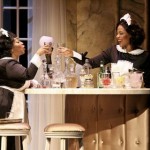 But this is, after all, meant to be a comedy. And that it is! The audience laughed . . . and laughed heartily throughout the evening.
But this is, after all, meant to be a comedy. And that it is! The audience laughed . . . and laughed heartily throughout the evening.
Overall, it’s an engaging night at the theatre that will have you learning about the plight of African-American actresses long ago, but not so much that you feel too bad about it.
The playwright, Lynn Nottage, has created a website to extend her characters beyond the stage and draw people into a dialogue on race and representation in early cinema: http://www.meetverastark.com
For theatre tickets and information:
By the Way, Meet Vera Stark
Geffen Playhouse
10886 Le Conte Ave., L.A.
8 p.m. Tuesdays-Fridays; 3 and 8 p.m. Saturdays; 2 and 7 p.m. Sundays.
Runs until Oct. 28, 2012
http://www.geffenplayhouse.com
(310) 208-5454








